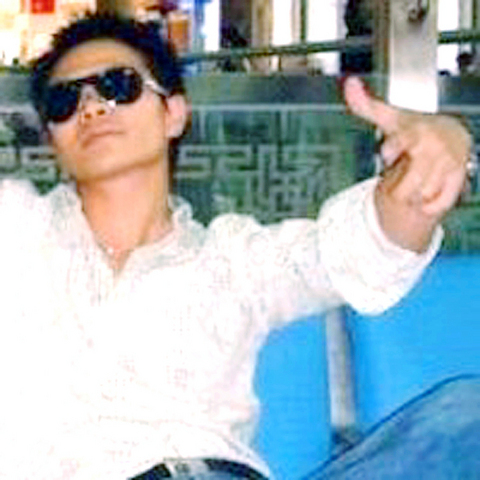A column designed to be a guide for "macking" -- US slang for picking up women -- on the Taipei City Government's English-language Web site touched off a media frenzy yesterday after a local tabloid ran a front page feature story about the column.
The column, "Macking in Taipei," was proposed by the city government's English consultants to attract more readers while teaching casual English in what they considered a creative way. The column's introduction and first article on the Web site's "English Corner" on Jan. 15, however, sparked complaints from residents who said the contents were too provocative to be put on a local government Web site.
The issue exploded after the Chinese-language newspaper Apple Daily ran a full front page detailing the Web site, under the headline "City government teaches foreigners to womanize," and included articles on the "favorite places for foreigners to hang out" in Taipei. Other media outlets, including a number of TV stations, quickly jumped on the issue after the newspaper hit the stands.

PHOTO: TAIPEI CITY GOVERNMENT WEB SITE
The column was proposed by the Web site's chief editor, John Bucher, and written by a military attache to the city's department of information, John Lee, a Taiwanese citizen who lived in Los Angeles for 16 years.
Contrary to the Apple Daily's report, the column did not specifically state that it was designed to help foreigners pick up girls in Taipei. It was presented as a broader "guide to attract women" for guys who want to "meet [their] Cinderella."
"Who am I? Good question. I'm the new military attache to the Department of Information. My name is John Lee. I'm Taiwanese, but I lived in Los Angeles for the past sixteen years," the column said. "I've just come back to serve my country. Am I a patriot? Time will tell."
"You are pathetic and you can't get a girl. Don't worry. I'm here to help. Want to be the Tiger Woods of love? Follow my directions, son, and you will be a statue -- a chiseled and polished love god," Lee wrote in the column introduction.
"You may think I sound pompous, but I'm just honest," the column said.
Taipei Mayor Ma Ying-jeou (
"Those articles are indeed improper [for a city government Web site]. I already made the information department remove the column," Ma said yesterday morning after presiding over a municipal meeting.
"Our English Web site was relatively popular compared to those of the government divisions, and the English consultants put some creativity in the articles, using slang or fresh topics to generate residents' interest in learning English," Lo Chih-cheng (
Both the editor and Lee declined to comment on the matter yesterday. But the department defended the staff.
"We thought the column was improper after seeing it on the Web site, and went talk to the editor. He was a little surprised at the response because he was just trying to be creative and attract younger people," the department's editorial officer Angel Chen (陳譽馨) said. "They will be more careful from now on in dealing with this kind of topic."

A Ministry of Foreign Affairs official yesterday said that a delegation that visited China for an APEC meeting did not receive any kind of treatment that downgraded Taiwan’s sovereignty. Department of International Organizations Director-General Jonathan Sun (孫儉元) said that he and a group of ministry officials visited Shenzhen, China, to attend the APEC Informal Senior Officials’ Meeting last month. The trip went “smoothly and safely” for all Taiwanese delegates, as the Chinese side arranged the trip in accordance with long-standing practices, Sun said at the ministry’s weekly briefing. The Taiwanese group did not encounter any political suppression, he said. Sun made the remarks when

The Taiwanese passport ranked 33rd in a global listing of passports by convenience this month, rising three places from last month’s ranking, but matching its position in January last year. The Henley Passport Index, an international ranking of passports by the number of designations its holder can travel to without a visa, showed that the Taiwan passport enables holders to travel to 139 countries and territories without a visa. Singapore’s passport was ranked the most powerful with visa-free access to 192 destinations out of 227, according to the index published on Tuesday by UK-based migration investment consultancy firm Henley and Partners. Japan’s and

BROAD AGREEMENT: The two are nearing a trade deal to reduce Taiwan’s tariff to 15% and a commitment for TSMC to build five more fabs, a ‘New York Times’ report said Taiwan and the US have reached a broad consensus on a trade deal, the Executive Yuan’s Office of Trade Negotiations said yesterday, after a report said that Washington is set to reduce Taiwan’s tariff rate to 15 percent. The New York Times on Monday reported that the two nations are nearing a trade deal to reduce Taiwan’s tariff rate to 15 percent and commit Taiwan Semiconductor Manufacturing Co (TSMC, 台積電) to building at least five more facilities in the US. “The agreement, which has been under negotiation for months, is being legally scrubbed and could be announced this month,” the paper said,

Japan and the Philippines yesterday signed a defense pact that would allow the tax-free provision of ammunition, fuel, food and other necessities when their forces stage joint training to boost deterrence against China’s growing aggression in the region and to bolster their preparation for natural disasters. Japan has faced increasing political, trade and security tensions with China, which was angered by Japanese Prime Minister Sanae Takaichi’s remark that a Chinese attack on Taiwan would be a survival-threatening situation for Japan, triggering a military response. Japan and the Philippines have also had separate territorial conflicts with Beijing in the East and South China